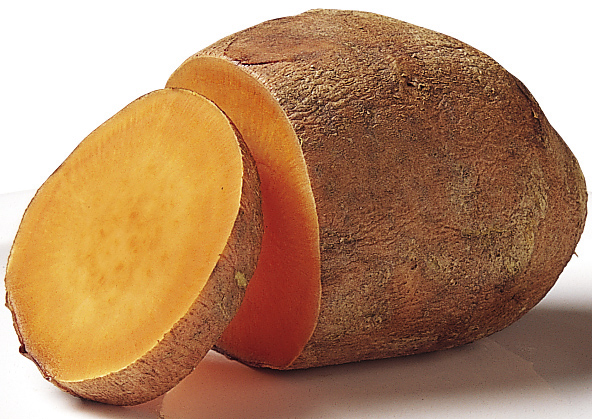Orange-fleshed sweet potatoes are a rich source of vitamin A. Enhancing vitamin A levels in pregnant and lactating women helps prevent retinol deficiency conditions in their children.
In a study titled “Promotion of Orange-Fleshed Sweet Potato Increased Vitamin A Intakes and Reduced the Odds of Low Retinol-Binding Protein among Postpartum Kenyan Women,” Amy Webb Girard evaluated whether or not orange-fleshed sweet potatoes increased vitamin A levels in pregnant and lactating women in western Kenya.
The research study was done under the Sweet Potato Action for Security and Health in Africa (SASHA). The program’s intent was to improve health education on nutrition and to examine the nutritional and diet status of pregnant and lactating women in western Kenya. A previous study in Nandi County in Kenya had revealed that out of 88 postpartum women, 78.1 percent had low retinol concentrations in their breast milk and 10 percent had a severe vitamin A deficiency as well.
The Methodology of the Study
A total of 505 women out of 3,025 were eligible for the study. The women were in the first trimester of their pregnancy and were recruited during their first prenatal care visit.
They remained in the study until nine months postpartum. There were 250 women in the intervention group and 255 women in the control group. Women in the intervention group received enhanced nutrition counseling (which included additional information on vitamin A and its importance) and received vouchers for orange-fleshed sweet potato vine cuttings. Women in the control group received clinic-based nutrition counseling only.
A questionnaire was administered to gather information about the participants’ demographic data, socioeconomic status, food security, dietary habits, and vitamin A intake.
The women’s knowledge about nutrition and their overall health was evaluated. The women’s hemoglobin and retinol-binding protein (RBP) levels were also assessed.
Outcomes
By the end of the research study, sixty women had been excluded from the study due to eventualities that included twenty-six fetal deaths, twenty infant deaths, and one maternal death. There was one case of severe sickness, and four women had premature deliveries. Eight women had multiple deliveries. Forty-three other women relocated permanently out of the study area. Only 206 mothers completed the study, with 104 women in the intervention group and 102 in the control group.
There was no significant difference in the total scores on nutrition knowledge among all the women at enrollment. However, the women in the intervention group scored higher in relation to vitamin A knowledge at enrollment.
The scores continued to increase throughout the study. In particular, women’s knowledge of infant and young child feeding increased significantly in both groups.
The consumption of orange-fleshed sweet potatoes and vitamin A intake was high in the intervention group. About 8.4 percent of women in the intervention group consumed orange-fleshed sweet potatoes at enrollment. Consumption increased to 28.7 percent in the last trimester, 35.7 percent at four months postpartum, and 55.7 percent at nine months post-delivery. Only one woman in the control group consumed orange-fleshed sweet potatoes throughout the study; consequently, the impact of the consumption of orange-fleshed sweet potatoes could not be accurately determined.
Thirty-one percent of all the women were anemic at enrollment. The risk of anemia decreased among the intervention group in late pregnancy. Maternal mid-upper arm circumference (MUAC) was high in both groups at enrollment. However, MUAC continued to decrease at each follow-up in the control group, but it significantly increased for the women in the intervention group.
Conclusion
Orange-fleshed sweet potatoes are a great source of vitamin A if they are incorporated as a staple food in the diet. With vigorous health education and advocacy, the production of orange-fleshed sweet potatoes can be a long-lasting solution to the need for vitamin A.
Vitamin A intake can greatly impact the nutrition of both mothers and children. Therefore, education about other meals, fruits, and vegetables that are rich in vitamin A is also important for pregnant and lactating women.
The major challenge of the study was the task of producing orange-fleshed sweet potatoes from pregnancy to nine months postpartum. Thus, this solution would be more effective if orange-fleshed sweet potatoes were produced year-round.

Reference
Girard, Amy Webb, Frederick Grant, Michelle Watkinson, Haile Selassie Okuku, Rose Wanjala, Donald Cole, Carol Levin, and Jan Low. “Promotion of Orange-Fleshed Sweet Potato Increased Vitamin A Intakes and Reduced the Odds of Low Retinol-Binding Protein among Postpartum Kenyan Women.” The Journal of Nutrition 147, no. 5 (2017): 955–963. Retrived from https://academic.oup.com













